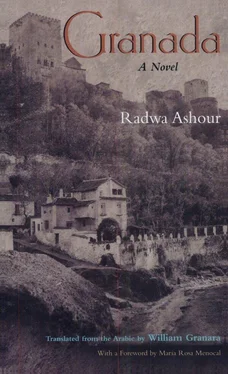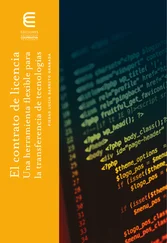Radwa Ashour - Granada
Здесь есть возможность читать онлайн «Radwa Ashour - Granada» весь текст электронной книги совершенно бесплатно (целиком полную версию без сокращений). В некоторых случаях можно слушать аудио, скачать через торрент в формате fb2 и присутствует краткое содержание. Год выпуска: 2003, ISBN: 2003, Издательство: Syracuse University Press, Жанр: Современная проза, Историческая проза, на английском языке. Описание произведения, (предисловие) а так же отзывы посетителей доступны на портале библиотеки ЛибКат.
- Название:Granada
- Автор:
- Издательство:Syracuse University Press
- Жанр:
- Год:2003
- ISBN:9780815607656
- Рейтинг книги:5 / 5. Голосов: 1
-
Избранное:Добавить в избранное
- Отзывы:
-
Ваша оценка:
- 100
- 1
- 2
- 3
- 4
- 5
Granada: краткое содержание, описание и аннотация
Предлагаем к чтению аннотацию, описание, краткое содержание или предисловие (зависит от того, что написал сам автор книги «Granada»). Если вы не нашли необходимую информацию о книге — напишите в комментариях, мы постараемся отыскать её.
Granada — читать онлайн бесплатно полную книгу (весь текст) целиком
Ниже представлен текст книги, разбитый по страницам. Система сохранения места последней прочитанной страницы, позволяет с удобством читать онлайн бесплатно книгу «Granada», без необходимости каждый раз заново искать на чём Вы остановились. Поставьте закладку, и сможете в любой момент перейти на страницу, на которой закончили чтение.
Интервал:
Закладка:
He yells back,fully aware of his own lying: “Who said I’m starving? I swear to Almighty God I am not starving.” Yet he cries in hunger and in fear for the horse.
His father refuses to slaughter the horse. His mother picks vine leaves, boils them in water, and feeds the children. She pounds palm fronds until they turn mealy, like flour. She kneads it with water, flattens it out,… they eat.
The fading dusk light did not obscure Saad’s face from Saleema, yet she couldn’t understand his nervous fidgeting nor the restrained anxiety that manifested itself on his twitching face. At the same time she felt a profound sadness deeply embedded within him but was at a loss as to why it was there. When she noticed the tear stealthily trickling from the corner of his eye, she held out her hand and took hold of his.
Saad had succeeded in bringing Hasan and Saleema home safely and then headed toward the shop. I’ll wait for him there awhile, he thought, and if he doesn’t return, I’ll go back to the parade site and look for him. Then he noticed the light of the lantern creeping in from underneath the door of the shop, and he knew that Naeem had finally come home.
“What happened? Where were you?”
Naeem mumbled something underneath his breath and looked as though he were upset, then he answered sheepishly: “I marched in the parade.”
“Why would you do something like that, and why didn’t you tell us?” Saad was shouting at the top of his lungs, and all too aware that he would pounce on Naeem at any moment if he didn’t get a satisfactory explanation for his conduct.
“What happened?”
“Calm down, Saad. I can’t answer unless you calm down. I’m just as upset and depressed, and I’m at my wit’s end.”
“What happened?”
Naeem stood up and started to prepare something for supper. They ate in silence, without a word. When they finished Naeem spoke.
“I’ve fallen in love with the young girl.”
“What young girl?”
“The one in the parade, the one in the white robe.”
“And, so?”
“She’s stolen my heart, and I’m frightened, and I don’t even know her name. I ran after the procession and tried to catch up with her. I began to make noises to attract her attention. She looked in my direction, and I felt she noticed me too, but the guards pushed me away. I fell down. She was watching, and she smiled. Then the guards moved her to the other side of the procession so I couldn’t see her. I marched along keeping pace in the hopes of seeing her again, but I didn’t. Now what can I do?”
“Blow out the lantern and go to sleep!”
Saleema came to the shop looking for Abu Jaafar, but he wasn’t there. “Tell him when he comes that Grandmother…” Saad didn’t hear a word she said. It happened faster than a flash of lightning. He averted his eyes, unable to look at the face he saw a thousand times but could only see when the blindness fell from his eyes. When he glanced up and the butterflies gathered in his stomach, he looked down again. That night, Saad couldn’t fall asleep. He lay awake, tossing and turning as though he were consumed with fever. The next few days he stopped going to Abu Jaafar’s house and asked Naeem to go instead whenever the need arose. He concocted one excuse after the other. Whenever the urge to divulge his secret to Naeem overcame him, he became tongue-tied. The more he tried to cure whatever was gnawing at his heart, the stronger it kindled with the flames of passion.
Two months later he told his friend everything. Naeem jumped for joy when he heard Saad utter the words, “I’m in love,” but when Saad continued, “with Abu Jaafar’s granddaughter, Saleema,” Naeem’s joy turned into reticence and he found himself at a loss for words. After a few moments he said, “Love her for awhile, and then love someone else.” What Naeem was saying was totally in tune with what Saad was thinking. What would Abu Jaafar say if he knew? Would he say, “I entrusted Saad with the safety of my family, and now he has betrayed my trust.” Would he accept if Saad asked for her hand in marriage? Wouldn’t he say that he has no money nor family, and he only wants to marry his granddaughter to secure wealth and position for himself.
Naeem repeated, “Love her for now, a week or two, but then look for someone else to fall in love with. I was worried about you, brother. I said to myself, Saad’s locked himself away from women, but now the lock has been opened.”
After several moments of silence, Naeem asked, “How is it that you came to fall in love with her?”
“I don’t know.”
“I’m concerned about you. I want to compare your love for women with mine. Tell me everything, all the details of how it came about, this love of yours for her.”
Hasan and Saleema received the usual pampering of being raised in a grandfather’s house, if not more, especially since they were the children of their dearly beloved father whose life was cut short before his time. Abu Jaafar not only provided them with everything they wanted, but he also pinned all his hopes and dreams on them. He brought Saleema a private tutor to give her lessons in reading and writing, and when Hasan turned seven, he enrolled him in the class of the most prestigious faqeeh in town. He would say to Hasan, “Granada has fallen, Hasan, but who knows, some day it may return to you, even by way of your own sword, or perhaps you will write its story and record its glories for all time. It’s not my intention that you become a paper maker like myself, my boy. I see you rather as a great writer, like Ibn al-Khateeb, [11] Lisan al-Din Ibn al-Khatib (1313-74), vizier at the Nasrid Court, was an eminent bellettrist and historian, but was later accused of heresy, exiled to Fes, and murdered while in prison.
and your name will be synonymous with Granada and memorialized along with it in every book.”
Saleema was only nine years old the day Saad looked into her eyes and turned away in shame. She definitely noticed it, and it caused her to wonder. What she saw confused her since Saad’s presence in the household was as familiar and natural as that of Hasan, Naeem, her grandfather, and even her tutor. But his look that day and her feelings about it were both strange and new to her, and she didn’t know how to deal with them. The matter preyed on her mind for several days, and she pretended to forget it, until eventually she did. Saleema was not conscious of her femininity the way other girls her age were, girls whose families were already making arrangements for their betrothals. Abu Jaafar, who never revealed his innermost thoughts to anyone, harbored a fervent hope that Saleema would become like Aysha bint Ahmad, the pride and joy of Cordovan ladies and gentlemen alike, who surpassed them all in intellect, erudition, and culture. He was not concerned about her marriage, nor did he ever raise the subject with her. Her mother felt the same way, but for entirely selfish reasons. Her intense attachment to her daughter made her shiver even at the thought of being separated from her, living far away with a strange man in a strange house.
Friends and acquaintances of Abu Jaafar warned him about what it would cost to educate both his grandchildren, calling it a senseless waste of money. These are not times for Islamic scholars and judges, nor for Arabic manuscripts, for that matter. Spanish is the language of the future, and there will be no financial rewards for knowing Arabic, they would say. Abu Jaafar would listen to them and not say a word. But he never gave a thought to depriving the two little ones of an education, not only because he was adamant about realizing his dreams, but because he was resolutely convinced that refusing to educate them was tantamount to surrendering to a defeat that Almighty God may not decree in the end. His dreams had not abandoned him, so why would he abandon his dreams? He liked to imagine that everything that was happening was only a fleeting nightmare, and that it was impossible that God would abandon His servants and forget them as though they never worshipped Him nor built His abode with their hearts bursting with love for Him. He imagined days to come in which the Castilians would withdraw to the north and leave Granada to live in peace, in the security of the Arabic language, and in the comfort of the muezzin’s call to prayer. He knew that he would most likely not live long enough to see all of that. He told himself that his soul one day would be seen circling the skies of the city in the form of a white dove, gliding in the air, flapping its wings from the towers of Alhambra to the minaret of the Great Mosque, landing in its courtyard to pick up the scraps of bread the young pupils leave for him. Then it would take flight and hover over the city and follow a path, and land at the end of the day on a window’s edge in a house in Albaicin that used to be his own, and that is now occupied by Hasan the Granadan, the writer, who burns both ends of the candle as he dips his plume into the inkwell and writes.
Читать дальшеИнтервал:
Закладка:
Похожие книги на «Granada»
Представляем Вашему вниманию похожие книги на «Granada» списком для выбора. Мы отобрали схожую по названию и смыслу литературу в надежде предоставить читателям больше вариантов отыскать новые, интересные, ещё непрочитанные произведения.
Обсуждение, отзывы о книге «Granada» и просто собственные мнения читателей. Оставьте ваши комментарии, напишите, что Вы думаете о произведении, его смысле или главных героях. Укажите что конкретно понравилось, а что нет, и почему Вы так считаете.












